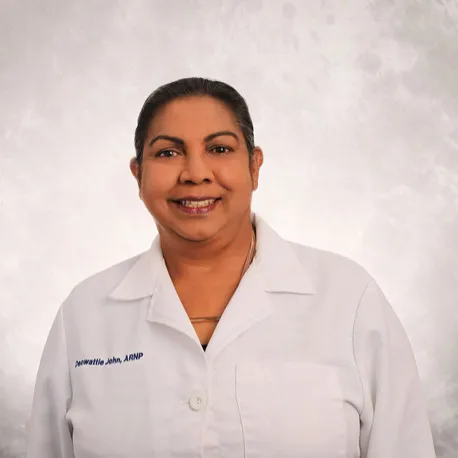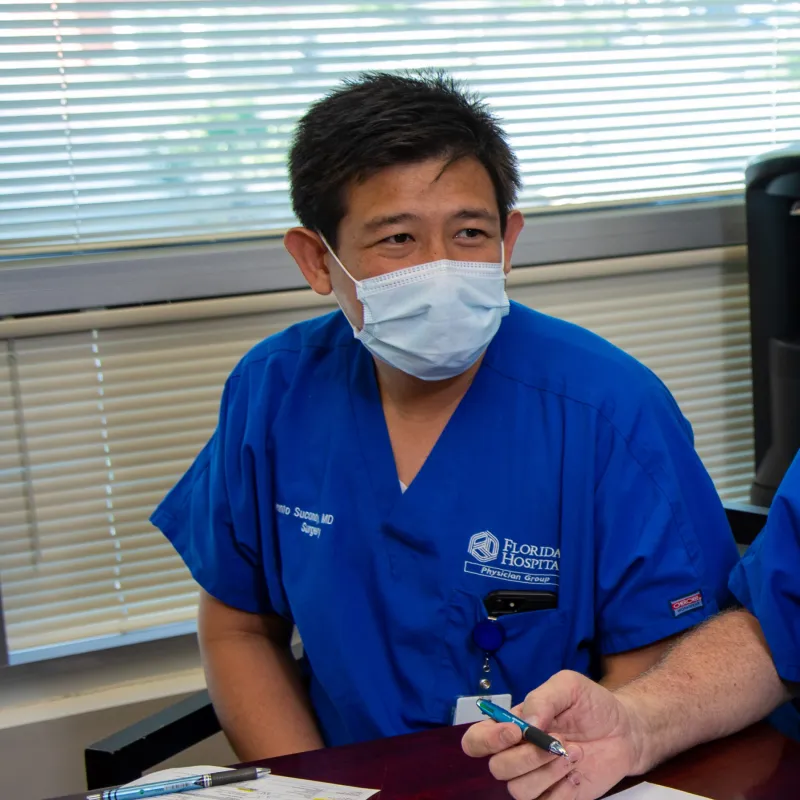
Colon and Rectal Specialists Offer Minimally Invasive Treatment for Colon & Rectal Polyps
The gastroenterologists and colon and rectal surgeons at the AdventHealth Digestive Institute Tampa have advanced training in removing colon and rectal polyps. They do so either through non-surgical methods such as colonoscopy (often right as a patient is having a routine screening colonoscopy) or through minimally invasive surgery.
What Is a Polyp?
A polyp is an abnormal tissue growth that can occur in various places of the body. When they form in the lining of the colon or rectum, most polyps are benign (non-cancerous) and do not cause symptoms. However, polyps larger than one centimeter have a higher risk of turning into cancer. This is also the case for polyps in patients with a family history of polyps or colorectal cancer.
Colorectal Polyp Causes
Causes of colorectal polyps are often dependent on the type.
There are two main types of colorectal polyps:
- Non-neoplastic polyps – This type of polyp does not usually develop into cancer. It may be caused by inflammation as with an inflammatory bowel disease (IBD) or an H. pylori bacterial infection. Although polyps caused by IBD tend to be non-neoplastic, having Crohn’s disease or ulcerative colitis raises one’s risk for colorectal cancer. Occasionally a non-neoplastic polyp simply results from cells not dividing correctly for no known reason. This is also the case with neoplastic polyps, the second main type of polyp.
- Neoplastic polyps – This type of polyp has a much greater chance of turning into cancer. Most neoplastic colorectal polyps are adenomas. They are made up of glandular tissue, and they have the potential of turning into adenocarcinoma. Some adenoma polyps are also sessile polyps. Most polyps are on a stalk, which makes them easier to spot and remove. However, sessile polyps are flush with the tissue they are growing out of. Sessile polyps are always considered to have the potential to turn into cancer.
Certain inherited diseases may increase the likelihood of a patient developing a colorectal polyp. Such is the case as with familial adenomatous polyposis (FAP), a hereditary condition that causes hundreds of colorectal polyps to develop.
Colorectal Polyp Symptoms
Most polyps are small and do not cause symptoms.
However, when colorectal polyps do cause symptoms, they are similar to those of colorectal cancer:
- Blood in stool
- Change in bowel habits
- Fatigue
- Mucous discharge from the anus
- Abdominal pain (rare)
Diagnosis of Colorectal Polyps
When polyps are merely suspected and not discovered through a routine colonoscopy, there are several tests your gastroenterologist may use to diagnose colorectal polyps.
Diagnostic tests for colorectal polyps include:
- Colonoscopy
- Sigmoidoscopy (rigid or flexible)
- Virtual colonoscopy with CT or MRI scan
- Barium enema
- Stool test
Treatment for Colorectal Polyps
In most cases, polyps are removed as a preventive measure to make sure they do not become cancerous. Most polyps are discovered during routine screening colonoscopies and are removed as part of the procedure. Because of this, colorectal cancer screening is the only widely used cancer screening that can prevent cancer. This is important because colon cancer and rectal cancer are very common. If more people got their recommended screening colonoscopies, the incidence of colon cancer would decrease.
After they are removed, most polyps will not recur. However, up to one-third of patients will go on to develop new colorectal polyps. Some patients who are prone to polyps may need to have more frequent screening colonoscopies than usual.
For patients with familial adenomatous polyposis (FAP), the chance of the condition leading to colon cancer is much greater than the general population. Patients with FAP will need to have more routine colorectal cancer screenings. In some cases, colorectal surgery may be recommended to remove parts of the colon at greater risk for cancer. Even after surgery, patients will continue to need screenings and have new polyps removed as they develop.
If you are due for a colonoscopy or have symptoms of a colorectal polyp, call AdventHealth Digestive Institute Tampa at Call813-615-7030 for an appointment with a gastroenterologist or colon and rectal surgeon.
Colon, Rectal and Anal Disorders
-
Colon and Rectal Cancer
Our experienced gastroenterologists can diagnose and treat colon and rectal cancer in Tampa. Learn more about treatment and surgery options.
-
Anal Cancer
Our colon and rectal surgeons can help diagnose and treat anal cancer in Tampa. We offer anal cancer surgery when necessary.
-
Anorectal Disorders
Surgeons at AdventHealth Digestive Institute Tampa offer advanced treatments for hemorrhoids, anal fissures, anal abscesses, anal fistulas and pilonidal disease.
-
Colon and Rectal Polyps
Colorectal surgeons and gastroenterologists at AdventHealth Digestive Institute Tampa offer advanced treatments for colon polyps, including sessile polyp and adenomatous polyp.
-
Diverticular Disease
The advanced gastroenterologists and colorectal surgeons at AdventHealth Digestive Institute Tampa help patients find cures for fecal incontinence.
-
Fecal Incontinence
The advanced gastroenterologists and colorectal surgeons at AdventHealth Digestive Institute Tampa help patients find cures for fecal incontinence.
-
Colon and Rectal Surgery
Our skilled colon and rectal surgeons provide the latest treatments for colorectal cancer, inflammatory bowel disease and other conditions that affect the colon and rectum.
-
Colonoscopy / Flexible Sigmoidoscopy
A colonoscopy or sigmoidoscopy is a way for doctors to see inside the colon and rectum to identify issues and perform biopsies.
-
High Resolution Anoscopy (HRA)
Colorectal surgeons at AdventHealth Digestive Institute are HRA providers (High Resolution Anoscopy) for anal cancer screening.

Recover Faster With Minimally Invasive and Robotic Surgery
All the surgeons at the Digestive Health Institute (DHI) at AdventHealth Tampa have a large depth of experience in offering minimally invasive surgery.
Meet The Experts

Deowattie John
MPH, MSN, ANP-BC
Nurse Practitioner

Todd Lime
WOCN, RN
Ostomy Specialist

Surgical Consultations For Digestive Cancer Without The Wait
Appointments Within Five Days for Patients with Cancer
At AdventHealth Digestive Institute Tampa, we know that after being diagnosed with cancer, patients want and often need to begin treatment quickly. So we make it a priority to offer appointments for cancer surgery consultations within five business days, and often earlier.
Patients who are newly diagnosed with cancer, or have just found out they have cancer again, qualify for this priority access. Our surgeons will make themselves available to see you right away, even for a second opinion. We want to help you start your treatment as soon as possible.
If you have been diagnosed with a cancer of the digestive system, don’t wait.
Call the Digestive Health Institute at 813-615-7030.
News and Info

How to Respond When a Loved One is Hesitant About the COVID-19 Vaccine
Expert answers to some commonly asked questions and concerns about getting a coronavirus vaccine.

Digestive Institute Surgeon Gives Invited Talk, Multiple Presentations at International Laparoscopic Liver Society’s 3rd World Congress
To help promote minimally invasive surgery – which has many benefits for patients – and share their expertise, AdventHealth Digestive Institute Tampa (DI) surgeons such as Iswanto Sucandy, MD, FACS, advanced HPB (liver, pancreas and bile duct) surgeon, and Sharona Ross, MD, FACS, advanced HPB...

Pregnancy and the COVID-19 Vaccine
Considering starting a family soon? Read more about the COVID-19 vaccine and pregnancy from our experts.

